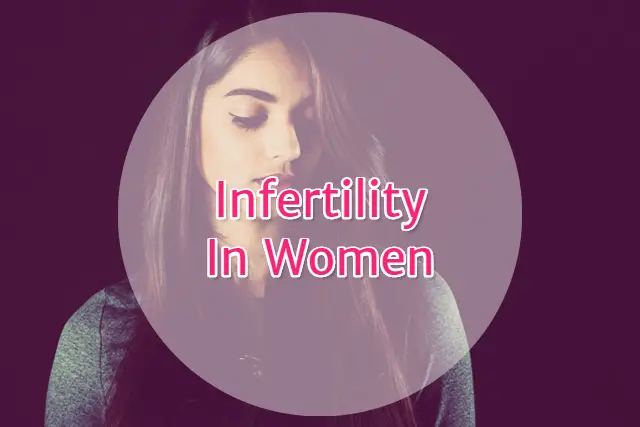If you’re a trying to conceive, then the last word you want to hear is infertility. Infertility in women accounts for almost half of infertility cases around the globe.
Every couple hopes to conceive every time they try. As the days go by, doubts begin to linger in the minds. The woman fears that perhaps she is infertile and unable to have a baby. Such fears are not unfounded, but there is good news also. Nowadays medical research has made it possible for an increasing number of infertile women to have babies.
What is infertility?
Infertility is the inability to get pregnant even after repeated unprotected intercourse for a year.
Many people around the globe are dealing with this for various reasons. What is the probability of infertility in women? Around 1 in every six women is dealing with some infertility issue.
Not being able to conceive is considered a curse for the woman in many societies. It is incredibly depressing not to be able to carry a baby. However, with the advancing technology and techniques, the problem of infertility in women can be rectified now. Assisted Reproductive Technologies is one such solution.

What is infertility in women?
Infertility in women is the inability to conceive a baby even after unprotected sex for over twelve months.
Female infertility informally can also encompass the incidents of miscarriages, a chemical pregnancy, and other such cases that terminate spontaneously.
Types of infertility in women
- Primary infertility in women: Primary infertility in women is infertility which exists before conceiving even once. This may be due to genetic defects or other reproductive disorders. For a complete list of causes and risk factors of female infertility.
- Secondary infertility in women: Secondary infertility is when a woman is not able to conceive the second time. This happens when the first pregnancy creates some hostility for subsequent pregnancies. Uterine scars formed after surgery of the womb are one cause of secondary female infertility.
It may even be in the case if you had a blood group mismatch with your baby and now you have antibodies against your baby. This disorder is called Erythroblastosis Fetalis.
If a Rh-negative woman conceives a Rh-positive baby, she is exposed to Rh protein, which is a blood group protein present on the surface of your cells. The first baby is delivered normally. For the next Rh positive baby, the mother has antibodies which destroy the baby at an early stage. However, this is debatable whether it is an infertility issue any longer. It is secondary infertility only when the woman is unaware of it. Otherwise, the female is fertile. - Sterility: Sterility is genetic or may be due to irreversible damage done to the female’s reproductive organs. There is no solution for this one which is possible inside the body. Sterility in women is an entirely abnormal reproductive organ or incapable reproductive organs. There are solutions to treat this kind of infertility. However, you will need to do them outside your body from a surrogate mother.
- Psychological infertility (asexuality) in women: A woman who psychologically doesn’t accept the fact that she is a woman or she should become a mother is asexual. While this may not be infertility entirely but apparently it is. Such women experience miscarriages repeatedly. It is essential for the mind and body to work in synchronization and only then harmony exists within the body.
- Unexplainable infertility: Sometimes the woman is healthy but small problems exist, and in combination, they make her infertile. The cause cannot be pinpointed. This is unexplainable infertility in women.
Symptoms of infertility in women
- Inability to conceive even after having regular sex for more than a year at various times
- Irregular menstrual cycle
- Dysmenorrhoea (painful periods) or amenorrhoea (absence of periods)
- Developing male characteristics like facial and body hair
- Frequent miscarriages
When to see a doctor for infertility in women?
- When you experience the above symptoms.
- If you find any other changes in your body like rashes on genital parts.
- Changes in the menstrual cycle.
- If you’ve had a medical history of any uterine surgeries.
- Depending on age decide whether you need to see the doctor within half a year if you are between 25 – 35 years or can wait till a year if you are less than 25 years old. For women above 40 years of age, you need to visit the doctor without even a day’s delay.
Problems faced by infertile women
An infertile woman has to face many complications. Let’s have a look at those:- Chronic depression: The society blames on the woman for her inability to conceive. It is nature’s will to give something or take something. Merely bearing a baby in her womb doesn’t define a body as a female. One should abhor such practices and stand up for the victims.
- Divorces and domestic violence: Even when the male partner is infertile people blame women. Countless marriages fall apart just because the female couldn’t bear a child. The financial burden of dealing with infertility is also often reasons for divorces.
- Social seclusion: An infertile woman feels embarrassed to go out and meet people or talk to colleagues and friends. Such social boycott could be mentally debilitating.
- Psychological problems: A woman suffering from infertility is subjected to torture and rebuking. She might even lose her self-confidence. Many women head to counselors and psychiatrists for talking about this. She might also develop epilepsy.
- Acute stress levels:Infertility tests and treatments are exhaustive. A woman often swings between hope and despair leading to acute stress levels. High stress also affects the ability to focus and remember things. Both emotional and physiological stress further hampers the body. Studies show that an infertile woman undergoes the same level of stress as that of an HIV or a cancer patient. Fertility drugs also cause forgetfulness.
- Insomnia: Once you are thinking of infertility day and night you might start experiencing insomnia. As the body’s biological clock gets affected, everything starts to fall off, and you might suffer a complete nervous breakdown.
- Appetite fluctuations: An infertile woman might not feel the urge to eat anything for hours. Appetite fluctuations happen because of the stress due to infertility issues.
- Anger and irritation: A woman dealing with infertility goes through something so unexplainable that only she knows how horrible it feels. She gets in her world of sadness. Even a slight problem can make her angry and irritated. It is not her fault entirely if she becomes unstable.
- Turning to drugs, alcohol and getting suicidal thoughts: Infertility in women has so many taboos associated with it that a woman is left with solitude and drugs. While some might be strong enough to steer away, others would give in such destructive measures.
- Disrupted sexual life: A couple dealing with infertility has to have sex like a cure rather than for pleasure. Sex loses its meaning for such couples. It may be painful and unsatisfying. The couple just becomes a baby making machine trying to get the parts do the production.






your test said I wasn’t pregnant but 9 months later I ended up with a baby that looked like a drowned rat in august with a sun hat like wtf your pregnancy tests do not work